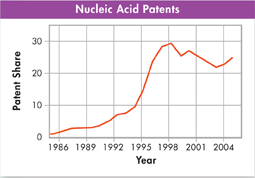15.4 Ethics and Impacts of Biotechnology
 What privacy issues does biotechnology raise?
What privacy issues does biotechnology raise? Are GM foods safe?
Are GM foods safe? Should genetic modifications to humans and other organisms be closely regulated?
Should genetic modifications to humans and other organisms be closely regulated?
Two-Column Chart As you read, write down the opposing viewpoints on each ethical issue.
THINK ABOUT IT Years ago a science fiction movie titled Gattaca speculated about a future world in which genetics determines people's ability to get ahead in life. In the movie, schooling, job prospects, and legal rights are rigidly determined by an analysis of the individual's DNA on the day he or she is born. Are we moving closer to this kind of society?
Profits and Privacy
 What privacy issues does biotechnology raise?
What privacy issues does biotechnology raise?
Private biotechnology and pharmaceutical companies do much of the research involving GM plants and animals. Their goal is largely to develop profitable new crops, drugs, tests, or other products. Like most inventors, they protect their discoveries and innovations with patents. A patent is a legal tool that gives an individual or company the exclusive right to profit from its innovations for a number of years.
Patenting Life When you think about patents, you probably think about an inventor protecting a new machine or device. But molecules and DNA sequences can be patented, too. In fact, roughly one fifth of the known genes in the human genome are now patented commercially. Even laboratory techniques like PCR have been patented. When a scientist wants to run a PCR test, he or she must pay a fee for the license to use this process.
The ability to patent is meant to spur discovery and advancements in medicine and industry. After all, patent holders stand a good chance of reaping large financial rewards. Sometimes, though, patent holders demand high fees that block other scientists from exploring certain lines of research. That was the case in developing provitamin A-enriched golden rice, a GM plant described in Lesson 15.3. Even after the rice was developed, patent disputes kept it out of the hands of farmers for years.

FIGURE 15–20 Patenting Nucleic Acids This graph shows the rise in the number of nucleic-acid patents between 1985 and 2005.
dNow consider the information held in your own genome.  Do you have exclusive rights to your DNA? Should you, like patent holders, be able to keep your genetic information confidential? When it comes to your own DNA, how much privacy are you entitled to?
Do you have exclusive rights to your DNA? Should you, like patent holders, be able to keep your genetic information confidential? When it comes to your own DNA, how much privacy are you entitled to?

Table of Contents
- Formulas and Equations
- Applying Formulas and Equations
- Mean, Median, and Mode
- Estimation
- Using Measurements in Calculations
- Effects of Measurement Errors
- Accuracy
- Precision
- Comparing Accuracy and Precision
- Significant Figures
- Calculating With Significant Figures
- Scientific Notation
- Calculating With Scientific Notation
- Dimensional Analysis
- Applying Dimensional Analysis




